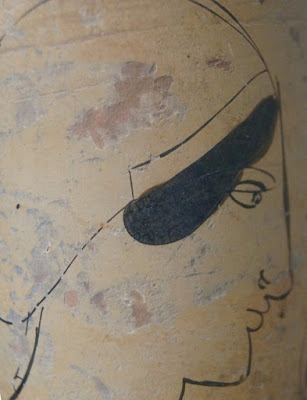Here
is an example of something that is ignored by the press and book
publishers because it is not in fashion, even though it is no less
interesting than something similar that is in fashion. Ancient Greece
is famous for its ruins, sculpture and painting on pottery. Ancient
Mayas are famous for their ruins, but their painting on pottery seems
to be almost completely ignored even though it is no less interesting
than the Greek painting. It is demonstrated in museum exhibitions
where one can see the Maya painted pottery. However, any publication
on the subject in either language (I mean English of Spanish) is hard
to find and comments in the museums are also extremely limited.
Examples here come from museums in Guatemala and Mexico.
Monday, 12 June 2017
Monday, 29 May 2017
Ancient Greek painting in the British Museum
The Greek painting in
the British Museum is easy to overlook. You will easily find the
sculpture of Classical Greece, but painting? Who has ever hard of
that? Well, perhaps not many people, but it is there and it is quite
interesting, here are the examples. Seeing these examples one is
tempted to thing that it is anything but primitive. However, you
won't find big canvasses you might expect when you thing of great
painting. Perhaps this is the very reason why not many people realise
that it exists. These paintings are hidden in a few small glass
cupboards in rooms upstairs, they are painted on clay vases. Greek
vases are, of course well known, though few visitors to the Museum
pays much attention. Even less realise that not all vases are
decorated in black and ochre colours, that there exist also white
vases with black paintings (or perhaps I should say drawings, or even
sketches?) on them.
Tuesday, 23 May 2017
Marbles of Suzhou.
I wonder whether there
is anyone who would be able to tell me what this is because I have no
idea. I saw them in Suzhou in China in traditional pavilions in the
famous gardens of the city. They are carefully framed and look as if
they were pictures but they are not. It seems that these are
cross-sections of marbles, framed and exhibited, sometimes next to a
picture. I wander why. Is there a Chinese tradition of exhibiting
marbles like that? I guess there must by, but where does it come
from? Obviously there is no equivalent tradition in the Western world
which is why I haven't found anything of the subject in a Western
language.
Friday, 5 May 2017
Lingyin Zen temple in Hangzhou
Lingyin si is a Zen
monastery in the hills around the West Lake in Hangzhou. It is
amazing how quickly the monasteries have been restored after the orgy
of destruction during the cultural revolution. In the hills around
Hangzhou there are several monasteries and nunneries. Interestingly
in one of them a nun gave me a book in English by Sheng Yen, a
Taiwanese Zen master whom I met many years earlier in Taipei.
Friday, 28 April 2017
City God Temple in Shanghai
The City God Temple in
Shanghai is a typical Chinese Taoist temple. Normally the centre of a
Taoist temple is a yard with an incense burner. Next to the yard
is a hall with giant figures. The Taoist saints usually have beards,
unlike the Buddhist ones. Behind this hall there is another one with
a nicely dressed figure of the City God. There people go to pray.
Monday, 17 April 2017
La Virgen de Guadelupe
Pictures of Our
Lady of Guadelupe are ubiquitous in Mexico. One can see them not only in churches or roadside shrines but even as grafitti in
cities
Friday, 7 April 2017
Becoming a chief in Vanuatu
Eating human flesh is now illegal in Vanuatu but whoever wants to become a chief has to prove that he can kill. The victims are pigs nowadays. During the ceremony of a nomination of a new chief they wait turn quietly (or sometimes not so quietly), tied to a palm tree on a plaza in front of a nakamal. A band playing on slit drums sits next to the entry to the nakamal. A throng of dancers circles the victim. The candidate for a chief is easily recognisable, he is the one who wields an axe. At the correct moment the axe splits the pigs scull, the pig falls in convulsions, blood running down its snout. The dancers in the meantime circle another victim. (This is no literary fiction, I witnessed a ceremony like this on Pentecost island).
Subscribe to:
Posts (Atom)























































